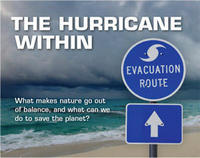The Hurricane Within
What makes nature go out of balance, and what can we do to save the planet?
An Ominous Trend
It has happened again. The Caribbean Islands and United States have taken a triple punch: first Hurricane Gustav, then Hannah, and now Ike. Hurricane Gustav brought fears that Hurricane Katrina’s massive devastation and loss of life may happen all over again as millions fled their homes in the New Orleans area. Fortunately, the storm weakened prior to landfall and the anticipated disaster was averted.
New Orleans escaped this time, but Haiti was not as fortunate. The rapid sequence of four hurricanes, beginning with Hurricane Faye in mid-August, resulted in a catastrophic destruction of the island’s infrastructure. While the immediate death toll from the storms was relatively low, the ensuing humanitarian disaster is expected to claim possibly hundreds of lives from disease and starvation.
And now, the Texas coastline has been battered by Ike. Galveston was flooded, fires erupted in areas inaccessible to firefighters, and millions lost power in Houston, possibly for weeks.
It’s easy to focus on events close to home, but nature’s onslaught has no geographic bias. Thousands are feared dead in India after monsoon floods caused a major river to break through its banks, cascading tons of water onto the villages below. In May, China was hit by a massive 8.0 earthquake that left nearly 70,000 people dead and 20,000 still missing months later.
On the other side of the world, the Chaiten volcano in Chile began erupting after thousands of years of silence. Nearby towns were evacuated as pyroclastic and lava flows threatened to engulf them.
In spite of our tremendous advances in science and technology, Nature continues to remind us how powerless we truly are. But is there anything we can do to prevent the next catastrophe? As a matter of fact, there’s a lot we can do. And it starts by understanding our relationship with Nature.
The Natural Balance
If we take a close look at Nature, we will observe a constant balancing act between all of its parts. All the elements are interconnected and interdependent to the point that changing even one small detail can take the whole system out of balance. The system quickly adjusts, however, in order to restore equilibrium.
This is easiest to see on a small scale. If you take a bucket of ice out on a summer day, the ice will quickly melt while the surrounding air temperature will drop just a bit. The extremes of hot and cold balance each other until they reach equilibrium. The same phenomenon happens in Nature on a larger scale, although the balancing of temperature and pressure extremes may temporarily result in the violent events that we call hurricanes, typhoons or tornadoes.
The principle of equilibrium also applies to the animal kingdom. Every element in the ecosystem, whether animal or vegetative, operates to ensure the balance and harmony of the system. Don’t be misled by the harsh scenes of violence from the last nature documentary you saw. While Nature may seem cruel on the outside, a closer look shows that all the struggles and clashes are actually aimed at increasing its inner balance. Dr. Jane Goodall, the famous chimpanzee researcher who spent many years of her life in the jungle, testifies about it when sharing her experience: “I felt that there is not a single evil force in Nature, but only pure love.”
The Egoistic Imbalance
Humans, on the other hand, are the only creatures who consistently disturb Nature’s perfect balance. We worry only for our own sake while ignoring the balance and wellbeing of the entire system. That is why we allow ourselves to exploit each other, and even raise ourselves on the ruins of others. In fact, we tend to view Nature as something to be used for our own benefit.
We don’t always understand the connections between our actions and Nature’s response, but “ignorance of the law is no excuse.” And as we try to convince ourselves that elaborate levee systems, high-tech modeling tools, and early warning systems will keep us safe, Nature repeatedly shows us that we are not exempt from its laws.
Harmonizing with Nature
The wisdom of Kabbalah tells us that we are an integral part of Nature’s system. Even if we don’t realize it, when we relate egoistically to each other and to the environment, we take the whole system out of balance. In turn, Nature inevitably applies “correcting” forces to rebalance its systems. And the more we move toward egoism, the more extreme are the means that Nature applies to push us back to balance. Eventually, we will be forced to recognize that only Nature can win this battle.
But we have a choice. We can choose to align ourselves with the system of Nature, rather than battle it. So if we are to solve the ecological crisis, we must learn how Nature functions and implement its principles in our human society.
To this end, we should first harness the various information systems to bring to public awareness the cause of our ecological crisis – consistent, ongoing violation of Nature’s balance. On a parallel track, we should create the broadest possible awareness that all of Nature is a single multi-celled body in which every cell is connected to and dependent upon the other cells. In order for human society to be in balance with Nature, it likewise must begin operating as a single, interconnected and interdependent body.
If we acknowledge that humanity and Nature are one, and work to change the relationship between us from separation to unification, then we will bring balance back to Nature and thereby reach safety.
